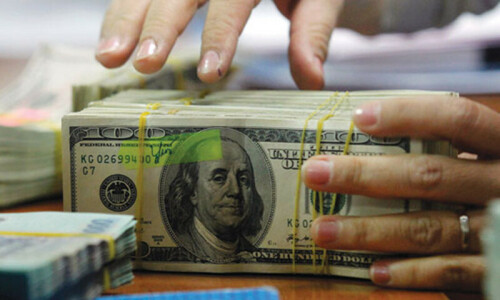KARACHI: Reextending its $2 billion loan, which was originally scheduled to expire in March, for an additional year is a significant relief for Islamabad, which is severely short on cash.
Pakistan’s request for a rollover of the loan was approved by China on Thursday, the finance ministry stated, taking into account Pakistan’s current incapacity to repay the credit.
Loans from friendly nations make up the majority of the State Bank of Pakistan’s (SBP) foreign exchange reserves. The central bank is currently essentially unable to repay foreign loans, despite having previously provided dollars for debt servicing.
Despite receiving $1.8 billion under the Stand-By Arrangement and managing to establish ties with the IMF despite difficult circumstances, the caretaker administration was unable to strengthen its foreign exchange reserves or come up with a plan to raise them.
SBP holdings drop below $8 billion, raising questions in light of slowing remittances and dried-up inflows.
In mid-June 2023, Pakistan received a $1 billion loan from China. Actually, Pakistan paid back the amount, and China granted Pakistan’s request to have the money returned.
The $2 billion rollover will assist Pakistan in keeping its foreign exchange reserves at a respectable level. Nevertheless, the SBP’s most recent report, released on Thursday, revealed that the dropped below $8 billion in reserves. Given that inflows have stopped, remittances are still below last year’s levels, exports from the main textile industry are declining, and negotiations with the IMF for fresh loans have not yet begun, the government must be quite concerned about this.
According to media sources, the administration intends to start negotiations with the IMF for loans totaling $6 billion. This is a difficult issue for the incoming political government, as acting Finance Minister Dr. Shamshad Akhtar has highlighted, stressing that the nation must continue to be part of the IMF program in order to maintain economic viability.
The SBP reports that loan repayments caused reserves to drop by $63 million to $7.949 billion in the week that ended on February 23. The possibility that this trend will affect the exchange rate—which has been steady for more than two months—raises concerns in the financial sector but also gives investors hope. During this time, foreign investors have substantially boosted their holdings of Treasury notes and stocks.
The SBP has kept $8 billion in foreign exchange reserves since December 2023. Reserves varied during this time, but they never dropped below $8 billion. Nevertheless, the withdrawal last week dropped the reserves below $8 billion, although the IMF wants the reserves to reach $9 billion by the end of June 2024.
Reliable sources within the Ministry of Finance are optimistic that the nation will secure the $1.2 billion third tranche by the end of March or early April of this year. As a result, the SBP’s reserves would rise, but more dollars will be needed to service foreign debt. The nation must pay over $25 billion on debt payments in FY24. The administration is making an effort to pay the minimum, negotiate longer payment delays, and roll over bilateral debts.
According to a prominent expert, “the most daunting issue is that the nation will need another $25 billion or more in the next fiscal year, FY25.”








